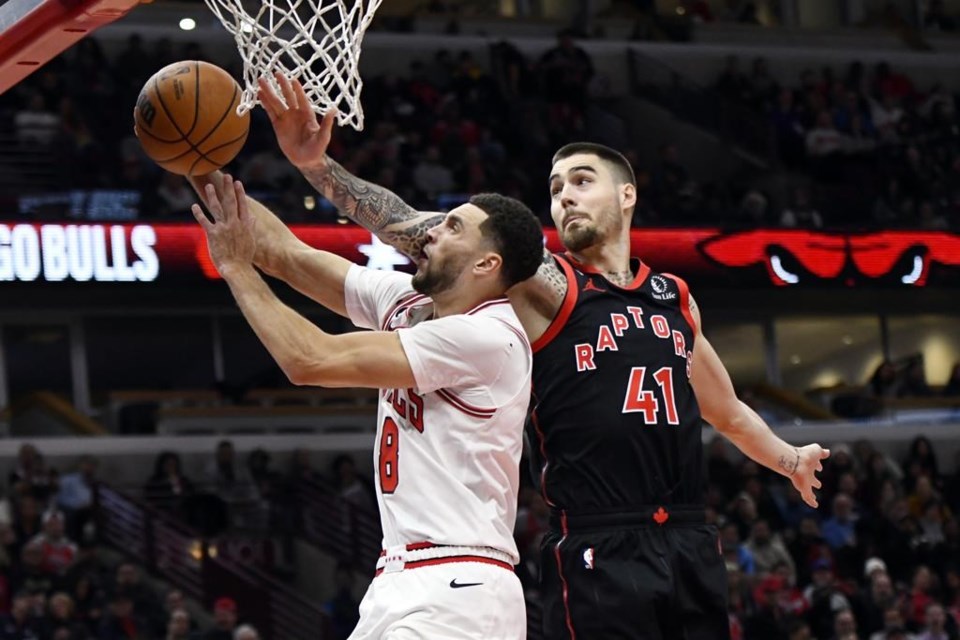TORONTO (AP) — Radio broadcast crews around the NHL and NBA are essentially back to normal after a couple years of pandemic-related challenges — with exceptions on the travel front and almost all in Canadian markets.
Radio broadcast crews for the Toronto Maple Leafs, Calgary Flames, and Vancouver Canucks are not on site for road games this season. The English language radio crew for the Montreal Canadiens also remains grounded.
Remote coverage that was previously a necessity due to travel restrictions has become the new normal for radio broadcasters who are being told to stay home and call road games off a screen.
“It’s not perfect, far from it, I’m somewhat embarrassed that we’re not there,” longtime Maple Leafs radio broadcaster Joe Bowen told The Canadian Press. “But that’s the situation that it is. So we’re trying to do the best we can under what we feel are some difficult circumstances.”
In the NBA, the Toronto Raptors are also sticking with remote radio coverage for road games.
TSN, a Bell Media property, and Sportsnet, part of a subsidiary of Rogers Communications, split radio coverage for both the Raptors and the Maple Leafs. A Sportsnet spokesperson declined to comment while a TSN spokesperson did not return messages.
Maple Leaf Sports & Entertainment Ltd., the parent company for both teams, declined to comment.
“COVID presented lots of challenges for the league, including for our broadcasters,” said Gary Meagher, the NHL’s senior executive vice president of communications. “While 95% of our broadcasters are now back to calling games in-arena, we know that the handful of radio crews that are still calling games remotely are providing their fans with the unmatched professionalism to which they are accustomed.”
Meagher said Ottawa, Winnipeg, Edmonton and Montreal (French only) were the four Canadian teams that had radio crews on site at road games. He added “a few” U.S.-based teams were providing TV simulcasts on radio for road broadcasts.
In the NBA, Jim LaBumbard, the league’s senior director of basketball communications, said 28 of the 30 teams have radio crews on site at road games. He said the Orlando Magic — who also use a simulcast — are the only U.S.-based team without a travelling radio crew.
Broadcaster Paul Romanuk, who has called hockey and Raptors games over his career and made remote calls for Olympic coverage, said a remote radio crew is limited in its ability to deliver the best possible product.
“You can’t look down at the bench and see if a player is hurting after he blocked a shot,” he said. “You can’t see if a player has gone to the dressing room. You can’t see if the coach is walking down to have a word with a player. You can’t see if a couple players are mixing it up behind the play. You miss all of that.
“You also might miss the odd line change. You can’t do as good of a job. You can’t be as precise.”
Bowen, who has called Maple Leafs games for more than four decades, goes to the Toronto TSN studio and downtown Sportsnet studio to voice the road games from the same feed a viewer gets at home.
“It’s a challenge, it really is,” Bowen said. “In my humble estimation, it’s not the right way to do it but the powers that be at present believe — I guess it’s a cost-cutting measure of some sort — so this is what we’re doing and we’re trying to do the best we can under the circumstances.”
Radio crews feel the atmosphere when thousands of fans have packed a venue and that vibe can be noticeable on air. Interaction with athletes and coaches at morning skates or shootarounds can also be invaluable for on-air story fodder and news nuggets.
“It’s a necessity to be on the road, it just is,” said Paul Edmonds, who does play-by-play for the Winnipeg Jets on CJOB. “To do your job properly and then also to do it I think with all of the integrity that you want to have on your broadcast, broadcasters in radio have to be on the road in my opinion.”
Many clubs allow radio broadcasters to join them on team charters. Other crews, however, have to navigate commercial flights and potentially longer stays in road cities, which can hike the travel bills.
In Major League Baseball, the Rogers-owned Toronto Blue Jays used remote coverage on Sportsnet 590 earlier this year before resuming in-person road radio coverage for the second half of the season.
With the 2022-23 NHL and NBA seasons just a few weeks old, it’s possible that radio coverage changes could be made.
“It’s sad because it’s not the way it should be,” Romanuk said. “I believe at the end of the day, in all of it, I think it’s the audience that’s being let down the most, whether or not they realize it.”
The Associated Press


